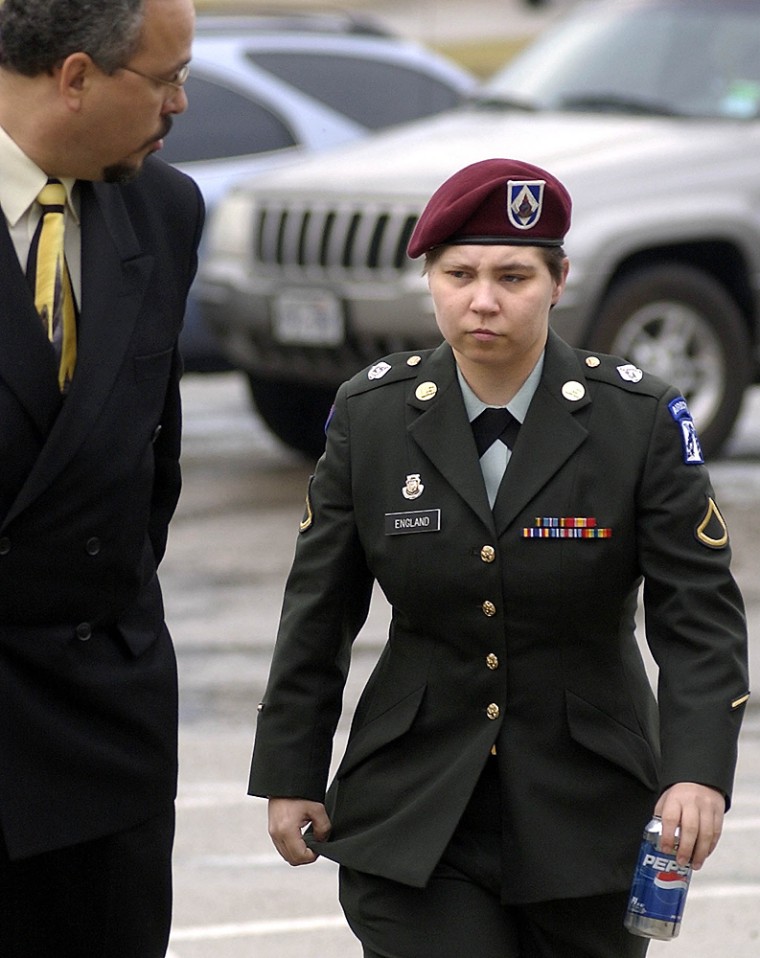A military judge Wednesday threw out Pfc. Lynndie England’s guilty plea to prisoner abuse at Abu Ghraib, saying that he was not convinced that she knew that her actions were wrong at the time.
Col. James Pohl entered a plea of not guilty for England to a charge of conspiring with Pvt. Charles Graner Jr. to maltreat detainees at the Baghdad-area prison.
The mistrial for England, a 22-year-old reservist who appeared in some of the most notorious photographs from the 2003 abuse scandal, means the case gets kicked back to the military equivalent of a grand-jury proceeding.
The action came after Graner, the reputed ringleader of the abuse, testified at England’s sentencing hearing that pictures he took of England holding a naked prisoner on a leash at Abu Ghraib were meant to be used as a legitimate training aid for other guards.
When England pleaded guilty Monday, she told the judge she knew that the pictures were being taken purely for the amusement of the guards.
'One-person conspiracy' not possible
Pohl said the two statements could not be reconciled.
“You can’t have a one-person conspiracy,” the judge said before he declared a mistrial and dismissed the jury.
Under military law, the judge could formally accept her guilty plea only if he was convinced that she knew at the time that what she was doing was illegal.
By rejecting the plea to the conspiracy charge, Pohl canceled that plea agreement.
Graner was called Wednesday as a defense witness on the second day of England’s sentencing hearing.
Graner, who is serving a 10-year sentence for his role in the scandal, said from the stand that one of the central acts of the case — in which England appeared in a photo holding a naked prisoner on a leash — was a legitimate prison procedure.
Graner said he looped the leash around the prisoner’s shoulders as a way to coax him out of a cell, and that it slipped up around his neck. He said he asked England to hold the strap while he took photos that he could show to other guards later to teach them this prisoner-handling technique.
At that point Pohl halted Graner’s testimony and admonished the defense for admitting evidence that ran counter to England’s plea on the conspiracy charge and one count of maltreating detainees.
The judge did not discuss the other five counts to which England had pleaded guilty.
England’s mother attended the hearing and brought England’s seven-month-old baby, reportedly fathered by Graner, to the courthouse. At one point, England turned to the courtroom sketch artist preparing to portray Graner on the witness stand and said: “Don’t forget the horns and the goatee.”
Upset that England pleaded guilty
Graner on Tuesday told reporters in a handwritten note that he was unhappy that England pleaded guilty to mistreating Iraqi detainees at the Abu Ghraib prison in 2003.
“Knowing what happened in Iraq, it was very upsetting to see Lynn plead guilty to her charges,” wrote Graner. “I would hope that by doing so she will have a better chance at a good sentence.”
Graner continues to argue that he and the other Abu Ghraib guards were following orders from higher-ranking interrogators when they abused the detainees.
England pleaded guilty Monday to seven counts of mistreating prisoners. She told the court that the physical beatings and sexual humiliation were done for the guards’ entertainment and took responsibility for the smiling, thumbs-up poses she struck for photographs that made her the face of the prisoner abuse scandal.
Psychologist testifies
Her lawyers on Tuesday had sought leniency from the Army jury of five men and one woman.
A school psychologist from Mineral County, W.Va., who worked with England when she was a child, testified that she was oxygen-deprived at birth, speech impaired, and had trouble learning to read.
Thomas Denne said England’s learning disabilities were identified when she was a kindergartner, and though she made progress in school, she continued needing special attention.
“I knew I was going to know Lynndie England for the rest of my life,” Denne said.
When asked by Pohl whether England knew right from wrong, Denne said she had a compliant personality and tended to listen to authority figures.
Rick Hernandez, a defense lawyer, said the psychologist’s testimony helped England by establishing that her ability to reason was lower than that of her comrades.
“She is clearly in a different mental capacity... than any of the others accused,” he said.
Prosecutors cite pleasure
Capt. Chris Graveline, the lead prosecutor, told jurors in opening statements that England and a half-dozen other soldiers in the 372nd Military Police Company took great pleasure in humiliating the prisoners.
Graveline said England and Graner knew it was wrong to mistreat the detainees and take the photos, “but they did it anyway for their own amusement.” The prosecution rested its case without calling any witnesses.
The charges that England had agreed to plead guilty to carried up to 11 years in prison. Prosecutors and the defense had reached an agreement that capped the sentence at a lesser punishment, the length of which was not released.
But Pohl's decision invalidates the plea deal.
Four other Abu Ghraib guards and two low-level military intelligence officers have entered guilty pleas in connection with the scandal, with sentences ranging from no time to 8½ years. Spc. Sabrina Harman, a former Abu Ghraib guard, is scheduled to go to trial at Fort Hood next week.
